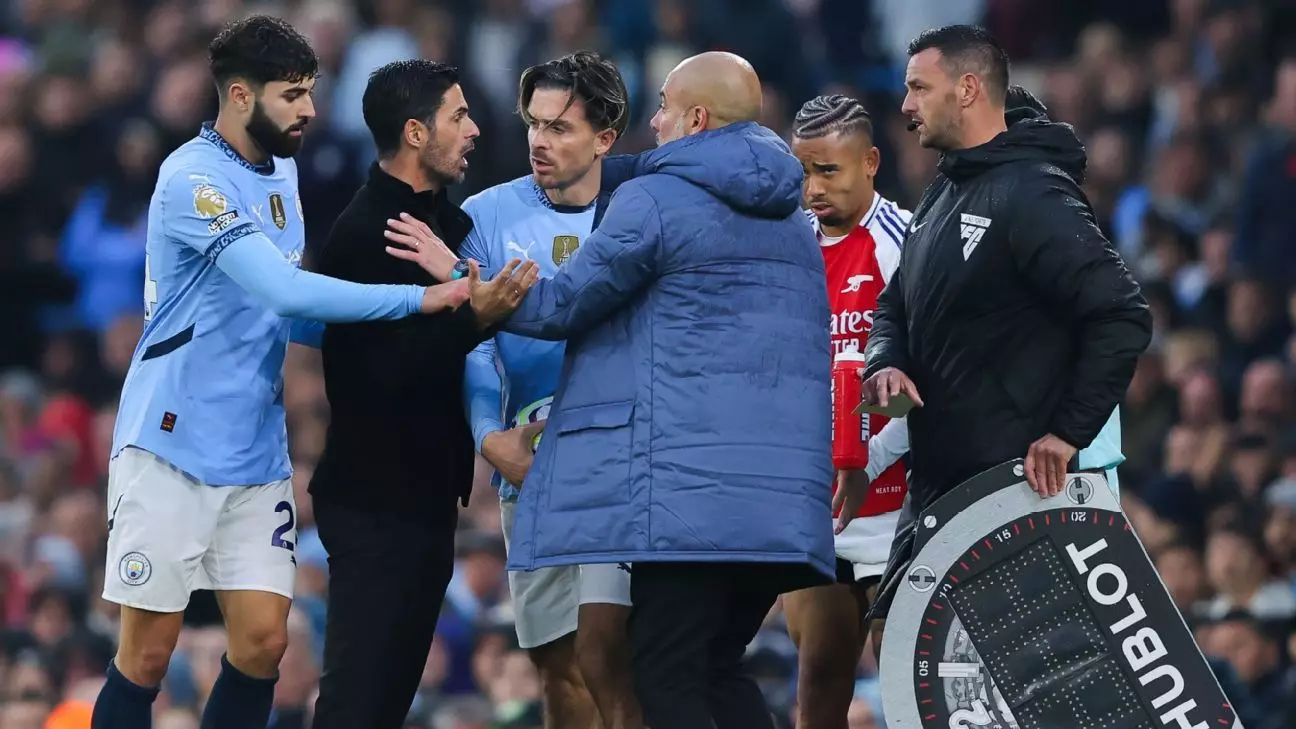In a thrilling encounter that ended in a 2-2 draw between Arsenal and Manchester City at the Etihad Stadium, the tension on the pitch did not stay confined to the field. Following the match, a series of pointed remarks from City players concerning Arsenal’s tactics ignited a debate about sportsmanship and competitive integrity. Central to this controversy was Arsenal’s strategy to fend off a furious City attack while a player was sidelined due to a red card, leading to accusations of employing “dark arts” during critical moments of the game.
Accusations of Dark Arts: A Closer Look
Prominent Manchester City figures like John Stones, Manuel Akanji, and Bernardo Silva were vocal in their criticisms of Arsenal’s approach post-match. Stones notably referred to Arsenal’s tactics as “clever or dirty,” suggesting that their defensive maneuvers were less about skill and more about gamesmanship. This characterization of Arsenal’s performance sparks a broader inquiry into what defines fair play in high-stakes football. While Stones and his fellow players framed their critique around complaints of time-wasting and manipulation of the game’s rhythm, Arteta retaliated by pointing to similar tactics employed by City when facing adversity.
Arteta’s dismissive response to the “dark arts” label sought to reframe the conversation away from accusations to a focus on the realities of player injuries. With key players like Gabriel Martinelli and David Raya potentially sidelined, the Arsenal manager aimed to shift the spotlight back to the challenges his team was facing, rather than the controversy surrounding their defensive techniques.
As the discussions turned from tactics to the physical state of the squad, Arteta revealed that several of his players might be facing injury-related absences in the upcoming fixtures. His priorities appeared clear: focusing on the team’s health and readiness for subsequent matches rather than engaging in a war of words with rival players. This revelation prompted questions regarding the ethical dimensions of the game and the fine line between strategy and unsportsmanlike behavior.
Arteta’s assertion that he “prefers facts over words” resonates with notions of transparency and accountability in football. By emphasizing that the potential injury issues outweigh tactical discussions, he redirected the conversation towards the stakes of winning and losing, which often comes into sharper focus during critical portions of the season.
Arteta also expressed a sense of realism when assessing past encounters against City, particularly reflecting on Arsenal’s 5-0 defeat in August 2021 when similarly disadvantaged. His comments underscored the importance of learning from tactical missteps. Arteta’s acknowledgment of previous failures shows his commitment to evolving as a coach and his intention not to repeat the mistakes of the past—a sentiment that resonates deeply in competitive sports.
He critiqued the perception of Arsenal playing defensively as a natural response when a team finds itself outmatched. Arteta argued that such adaptations are not merely tactical evasion, but crucial learning experiences that shape how teams compete under pressure. Here, Arsenal’s willingness to become a more strategic team—adapting to game circumstances—becomes a factor worth considering in the broader dialog of competitive ethos in modern football.
The Role of Humility: A Lesson for All
In the wake of the match, even the charismatic Erling Haaland found himself embroiled in the narrative, reminding Arteta to “stay humble.” While this advice may seem innocuous, it highlights the inherent pressures athletes face in the spotlight of high-stakes competition. The interplay of humility and confidence can define not just individual careers but shape entire squads. Arteta’s acceptance of Haaland’s remarks underlines the value of maintaining respect and humility amidst emotional turmoil.
The aftermath of the Arsenal versus Manchester City clash transcends mere allegations of unsportsmanlike conduct. It raises timeless questions about tactics, player conduct, and the evolving narrative of competitive sportsmanship. Arteta’s focus on injuries and learning experiences illustrates an adaptive mindset that prioritizes growth over grievances. In a sport driven by passion and performance, the lessons gleaned from such encounters will ignite discussions well beyond the pitch and could influence how the beautiful game is understood in the years to come.

